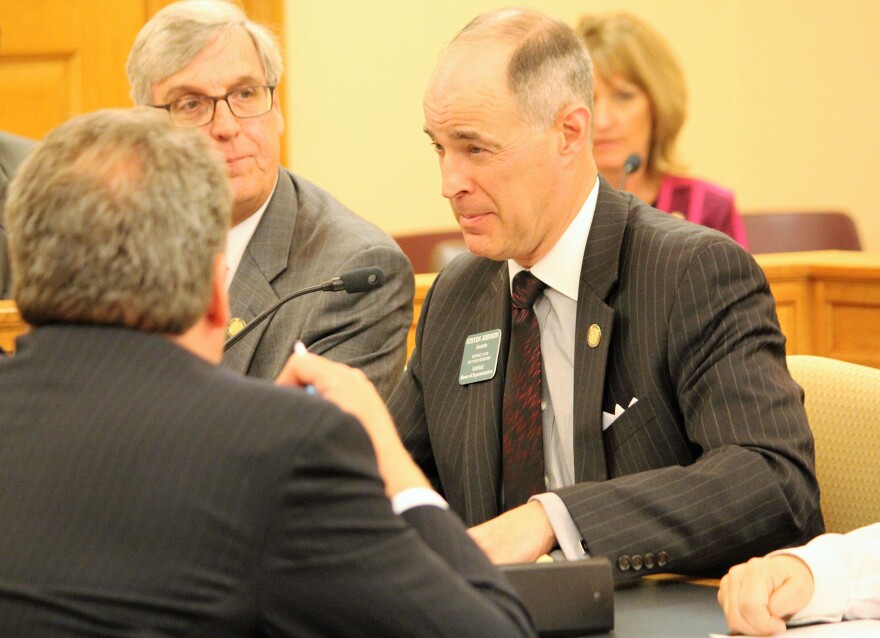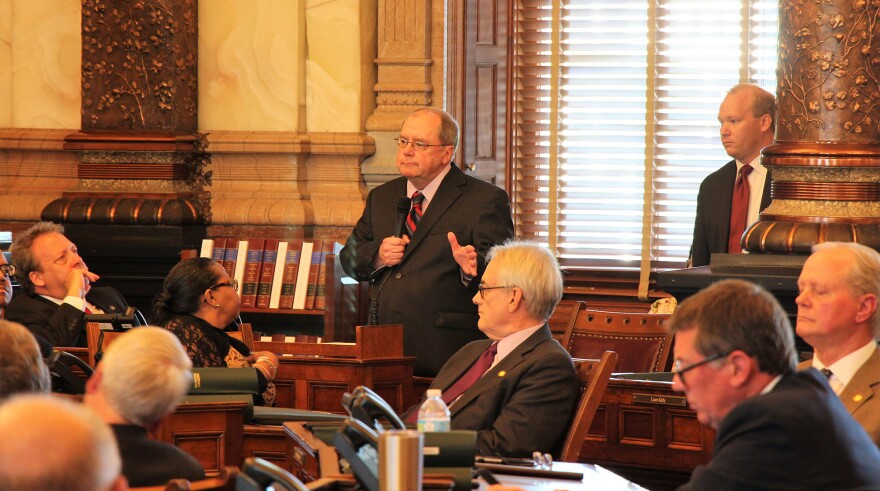The top Democrats in the Kansas Legislature are calling on Senate President Susan Wagle not to wait until January to start work on fulfilling a Kansas Supreme Court order to fix funding for public schools.
Senate Minority Leader Anthony Hensley, of Topeka, and his counterpart in the House, Jim Ward of Wichita, wrote a letter to Wagle, who heads the Legislative Coordinating Council, seeking an interim bipartisan panel of House and Senate members.
Read the letter to Senate President Susan Wagle from Sen. Anthony Hensley and Rep. Jim Ward.
“We were admonished by at least three of the Supreme Court justices that we’re dragging our feet,” Hensley said, adding that an expedited schedule would suit the importance of the task and signal to the court that lawmakers aren’t leaving the matter to the last minute.
RELATED: 5 reasons the Kansas Supreme Court found the state’s school funding unconstitutional
Wagle said Friday she is reviewing the request to determine whether it would be “efficient and productive.”
“Given the dim view the Kansas Supreme Court has taken with regard to the school finance work previously performed by legislative staff,” she wrote to Ward and Hensley, “we must carefully reflect on whether any meaningful work product can come from such a quickly convened interim committee that the Court would deem credible.”
Read Senate President Susan Wagle's response to the request for an interim committee on school funding.
Ward dismissed that characterization, saying a well-composed panel could help ensure lawmakers can “get to work on day one” upon returning to Topeka in January.
“It’s not just having an interim discussion — it’s making sure you have a broad base of the Legislature represented on that committee,” Ward said.
The committee he and Hensley want would meet for four days and receive briefings on the state Supreme Court’s Oct. 2 88-page ruling, in which the justices found the state’s school finance formula unconstitutional. It also would seek testimony from educators and others about how to respond, and draw up recommendations for the House and Senate to consider in January.
Crafting a fix
Asked whether Gov. Sam Brownback and Lt. Gov. Jeff Colyer are supportive of an interim committee, Brownback spokeswoman Rachel Whitten said such a panel is a matter for the Legislature to decide.
“The governor has said repeatedly that the court should not substitute its decision-making for decisions made in good faith by the elected representatives of the people of Kansas,” Whitten added.
Democrats aren’t alone in wanting to jump-start the process of tackling school finance.

“We need to come back in January with a plan or a number of options,” said Rep. Melissa Rooker, a Fairway Republican. “I don’t see us having the luxury of waiting three months to start engaging.”
To that end, Rooker said she had spoken with legislative leaders and Colyer, conveying her interest in participating in any interim efforts.
“That said, I’m certainly not waiting to hear what gets decided,” she said. “I’m doing what I have always done, which is to sit down and work out the to-do list and getting going with my own efforts.”
The court set an April 30 deadline for the state to file a brief explaining what action it has taken to remedy school finance since Oct. 2. That means lawmakers will need to craft a fix before then, with enough time left for the Attorney General’s Office to compose the brief.
Oral arguments are scheduled for May 22.
Lawmakers need to address four specifics of money distribution and spending rules that the court found unfair to poorer school districts.
“I don’t see that as a complicated process,” Rooker said, “to come up with the alternatives that we need to resolve those concerns.”
How much money is needed?
But the thorniest question will be overall spending levels. The justices concluded that funding for public schools falls short of the state’s constitutional obligation to provide education, but they didn’t specify how much is needed. Lawmakers agreed this spring to phase in a nearly $300 million increase over two years. After that, they agreed to adjust annual funding levels in line with inflation.
Hensley suggested Kansas could have dodged one of the court’s concerns about fairness — that lawmakers handed an extra $2 million to the Blue Valley and De Soto school districts without clear reasoning — by increasing aid to other districts as well.
For example, adding around $100 per student statewide to Kansas’ base funding formula, he said, would have achieved the same increase for Blue Valley while ensuring other districts are treated similarly.

The Legislative Budget Committee — a joint panel that monitors budget matters outside of session —received briefings from legislative staff last week on the Gannon ruling and current education appropriations.
Steven Johnson, an Assaria Republican on that committee who also is chairman of the House tax committee, said Kansans should “very definitely” let their lawmakers know how they want the Legislature to respond to the court.
The options, depending on how much money is needed, he said, are to find the money within the state’s available revenue, raise taxes or defy the court.
Considering the difficulty with which the Legislature passed a tax hike this year, Johnson expressed doubt that lawmakers have much interest in treading that path again.
“And it depends, will the governor at that time also suggest a tax increase is not necessary?” he asked. “If so, a veto-proof majority I don’t see as possible.”
Senate leaders issued a statement the day of the court ruling saying tax hikes aren’t an option and that the justices’ decision “puts the rest of state government and programs in jeopardy.”
Celia Llopis-Jepsen is a reporter for the Kansas News Service, a collaboration of KCUR, Kansas Public Radio, KMUW and High Plains Public Radio covering health, education and politics. You can reach her on Twitter @Celia_LJ. Kansas News Service stories and photos may be republished at no cost with proper attribution and a link back to kcur.org.






